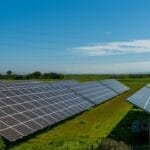Investing isn’t just about the money you make, it’s about how your money can make a difference. And right now, there’s no better investment than solar energy. So, let’s take a closer look at why solar is not just good for the environment, but also good for your bank account.
Key Points
- The solar energy industry is growing rapidly and has the potential to create many jobs.
- Investing in solar energy can result in significant savings on electricity bills.
- Installing solar panels can increase the value of a property.
- Solar energy plays a crucial role in both international trade and local economies.
- Government incentives and tax breaks make investing in solar energy a lucrative option.
The Solar Energy Boom: The Numbers Tell the Story
Let’s look at the numbers. Solar energy is not just a small, specialized market; it’s a rapidly growing industry. Over the last ten years, the cost of solar panels has dropped by more than 70%, making it easier than ever to install solar panels. This boom has been matched by a growing demand for clean, renewable energy. But what does this mean for the economy? It means a lot:
- On average, 9.5 jobs are created in the industry for each megawatt of solar power installed.
- Investing in solar can provide returns that outperform traditional bonds and stocks.
- Due to declining costs and technological advancements, the solar industry has experienced an annual growth of about 50%.
Empowering Communities: Job Creation and Upliftment
Simply put, solar power creates jobs. Each panel installed represents a team that engineered it, a crew that installed it, and a support network that keeps it operating. Solar power is not just about job creation, it’s about creating good, local jobs that cannot be outsourced. This is what community upliftment looks like – well-paid skilled labor that cannot be sent overseas.
And the best part? These jobs cater to a wide range of skill levels and industries, including manufacturing, installation, sales, and research. So, regardless of whether you’re a high-school graduate or a PhD holder, there’s room for you in the solar industry.
The most significant benefit of solar energy is that it helps to stabilize local economies. When communities invest in solar, they can decrease their dependence on imported fuels, which allows more money to stay within the local economy. This not only benefits job creation but also supports local businesses, schools, and public services.
Putting Your Money Where the Sun Shines: The Economic Impact of Solar Energy
As we increasingly tap into the sun’s energy, we’re not just producing electricity; we’re powering a robust economic machine. The economic impact of solar energy is extensive, from a boom in green jobs to propelling technological advancement. What’s special about solar is that it delivers a unique blend of environmental responsibility and economic expansion, a truly green investment for our future.
Boosting New Businesses: The Solar Entrepreneurship Surge
The solar industry is a breeding ground for startups. Innovators and entrepreneurs are attracted to solar’s potential, creating new technologies, services, and business models. This entrepreneurial surge is spurring growth and breathing life into the market. As a result, investors have the chance to get in at the ground level with companies that could be the energy titans of the future.
From the Backyard to the Global Market: Solar Energy’s Impact on International Trade
Solar energy is not only a rising star in local markets; it is increasingly influencing international trade. Countries with abundant solar resources are exporting panels and technology around the world, and nations with renewable energy goals are more than happy to import them. This rapidly expanding global market for solar technology is not only boosting international trade but also encouraging collaboration on worldwide energy strategies, thereby promoting geopolitical stability.
Furthermore, when countries put money into solar infrastructure, they lessen their dependence on imported fossil fuels, which greatly affects trade deficits and energy security. Therefore, solar energy isn’t just a way to invest in a cleaner planet—it’s also a way to invest in a more stable and balanced world economy.
For instance, a recent report revealed that the United States has become a net exporter of solar technology, indicating a significant shift in the country’s energy trade balance. This not only emphasizes the nation’s increasing dominance in the global renewable energy market, but also underlines the potential for significant economic gains from solar investments.
Planting the Seeds of the Future: Incentives and Tax Breaks Driving Solar Adoption
Understanding the terrain of government incentives and tax breaks is critical for anyone contemplating a solar investment. These financial incentives are intended to make solar more cost-effective and appealing to both individuals and businesses. They can significantly reduce the cost of installation and expedite the return on investment, making solar an even more persuasive option for those looking to make a difference with their investment dollars.
Breaking the Bank: A Closer Look at Government Solar Incentives
Let’s take a look at the different types of incentives that are available:
- Federal Investment Tax Credit (ITC): This incentive permits you to subtract a percentage of the expense of setting up a solar energy system from your federal taxes. The ITC has been a key component in the expansion of solar energy in the U.S.
- State and Local Incentives: Numerous states provide extra tax credits, rebates, or other incentives. These can differ greatly, so it’s crucial to investigate what’s accessible in your region.
- Net Metering: This regulation allows solar panel owners to sell surplus power back to the grid, further reducing installation costs.
These incentives not only make solar more affordable but also boost economic growth by promoting investment in renewable energy infrastructure.
Community Benefits: How Solar Initiatives Bolster Local Economies
When a community decides to go solar, the benefits are far-reaching. Many local governments offer additional incentives to encourage the adoption of solar energy, such as lower property taxes, waived fees, and expedited permitting processes. Not only do these initiatives help individuals and businesses that decide to go solar, they also stimulate the growth of local solar companies. This creates jobs and ensures that investment dollars stay within the community. To better understand these benefits, read about solar incentives and how they contribute to the local economy.
In addition, community solar projects let many people share the benefits of one solar array, making solar energy accessible to all. This can be especially helpful in underserved communities, where the initial costs might prevent people from using solar energy.
FAQ
Now, let’s tackle some frequently asked questions to shed light on the bright future of solar investment.
How does solar energy investment lead to more jobs?
Putting money into solar energy leads to job creation in many areas—from making the solar panels and installing them to maintaining them and selling them. These jobs are often in the local area and can’t be sent overseas, providing stable jobs in communities.
Will a solar energy system increase my home’s value?
Yes, it will. Solar installations are considered upgrades, similar to a renovated kitchen or a finished basement. They can increase the value of your property and make it more appealing to potential buyers who value sustainability and lower utility costs.
What are the broader economic effects of adopting solar energy on a large scale?
By widely adopting solar energy, we can decrease our national reliance on imported fuels, enhance our energy security, stimulate local economies through the creation of jobs, and promote global trade in renewable energy technologies.
What is the purpose of solar tax credits and incentives?
Solar tax credits and incentives are designed to make the installation of solar systems more affordable by offering financial benefits such as tax deductions, rebates, and credits. These incentives differ depending on the location and can significantly decrease the financial obstacles to investing in solar energy.
Why is solar energy a safe long-term investment?
Solar energy is a safe investment because it’s based on a renewable resource that’s not subject to market volatility like fossil fuels. Additionally, technological advancements and economies of scale continue to drive down costs, making solar an increasingly cost-effective solution.
FAQ
Before we conclude our discussion on the economic benefits of solar energy, let’s take a moment to answer some common questions. This will help clarify our understanding and inform future investment choices.
How does solar energy investment lead to job growth?
Investing in solar energy is a significant job growth driver. Here’s why: every solar project requires a team. From the time a solar panel is made until it’s installed and maintained, people are needed. These jobs are varied, from high-tech manufacturing jobs to on-site installation jobs. And as solar energy becomes more common, the demand for skilled workers in this field will only increase. When you invest in solar, you’re not just making your money work; you’re also helping others work.
Will installing solar panels boost my property’s value?
Indeed, installing solar panels can greatly boost your property’s value. Consider this—homes equipped with solar panels provide potential buyers with the perk of reduced electric bills. This is a major selling point. Research conducted by the Lawrence Berkeley National Laboratory discovered that homes with solar panels sell at higher prices than those without. Therefore, by switching to solar, you’re not merely saving on energy expenses; you’re investing in your home’s future resale value.
In addition, solar panels are viewed as a high-end upgrade, similar to a remodeled kitchen or a replaced roof. They’re a physical asset that adds to your home’s green and efficient nature. And in the current environmentally aware market, that’s a significant advantage for buyers.
Consider solar panels to be a long-term investment in your property. They are a way to protect your home from increasing energy costs and a step towards a more sustainable lifestyle. And when it’s time to sell, they could be a unique selling point for your property.
Therefore, if you intend to live in your house for a long time or are thinking about selling it in the future, solar panels are a wise investment that can yield returns both immediately and when you decide to put up that “For Sale” sign.
- Lawrence Berkeley National Lab states that homes equipped with solar panels can fetch a higher selling price.
- Solar panels are considered a high-end upgrade, similar to a kitchen renovation.
- They are a long-term investment that can protect your home from increasing energy costs in the future.
What are the broader economic effects of widespread solar energy use?
The broader economic effects of widespread solar energy use are vast and varied. To begin with, it decreases our dependence on fossil fuels, whose prices can vary greatly and are prone to international supply chain disruptions. By diversifying our energy sources, we can achieve greater energy independence and stability.
Additionally, the solar industry is a hotbed for technological breakthroughs. As more capital is invested in solar, we see improvements in efficiency and storage solutions, which in turn reduce costs and make solar even more available. This beneficial cycle of investment and innovation not only strengthens the economy but also lays the foundation for a sustainable energy future.
Moreover, solar energy can be a key player in addressing climate change, a major risk to the world’s economic health. By cutting down on greenhouse gas emissions, solar energy can help stave off the most damaging impacts of climate change. These include expensive natural disasters and interference with the world’s food and water sources.
What is the function of solar tax credits and incentives?
Solar tax credits and incentives are important mechanisms that governments use to promote the use of solar energy. They function by decreasing the initial expense of solar installations, making the transition to solar more financially viable for homeowners and businesses. Here’s how they usually work:
For example, the Federal Investment Tax Credit (ITC) lets you subtract a specific percentage of your solar installation expenses from your federal taxes. This can lead to savings in the thousands of dollars, making it easier to start investing in solar.
These incentives aren’t just a windfall for individual investors. They also stimulate the larger economy by encouraging the solar industry to grow. As more people take advantage of these benefits, we see a rise in solar installations. This, in turn, creates jobs and lowers the cost of solar for everyone.
It’s a triple win: the government backs green energy, you keep more of your hard-earned cash, and the economy benefits from the expansion of a high-tech, sustainable sector.
Why is solar energy a safe long-term investment?
Solar energy is a safe long-term investment for a number of persuasive reasons. Firstly, the sun is an unlimited source of energy. Unlike fossil fuels, which are limited and exposed to unpredictable markets, the energy from the sun is steady and dependable. This means that once you’ve invested in solar technology, you can count on it to generate energy and savings for many years.
Additionally, solar energy technology is consistently getting better. As improvements are made, systems become more efficient and less costly to install and maintain. This not only boosts the return on your initial investment, but also makes sure that solar energy stays a competitive and feasible energy source for a long time.
Finally, the increasing societal shift towards sustainability means that the need for clean energy will only continue to grow. By putting your money in solar now, you’re placing yourself in front of this trend, guaranteeing that your investment will be pertinent and valuable for the long term.
Finally, investing in solar energy isn’t just about clean power; it’s about investing in a sustainable and prosperous future. Solar energy is a bright investment opportunity, with its ability to create jobs, save money, and drive economic growth. So, if you’re looking to increase your property value, reduce your carbon footprint, or simply save on energy costs, solar energy is a smart and profitable choice for you and the world.









